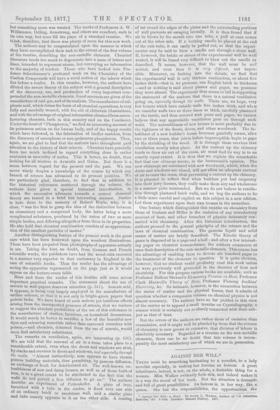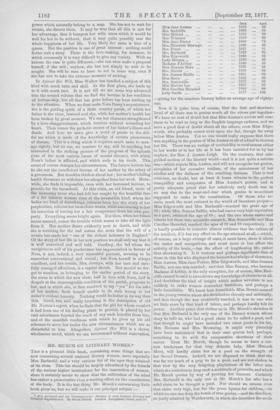AGAINST HER WILL.*
TIIERB must be something fascinating to a novelist, to a lady novelist especially, in making her heroine an heiress. A great inheritance, indeed, is not, on the whole, a desirable thing for a woman. Miss Walker evidently feels this, and indeed makes it. in a way the moral of her book. But the situation is dramatic and full of great possibilities. An heiress is, in her way, like a queen. She has the responsibilities, the opportunities, the Againei Her Will : a Novel, By Annto L. Walker, Author of "A Oauti.dialx Heroine," &o. I vols. London Samuel Tinsley. 1877.
power which naturally belong to a map. She has not to wait for events, she directs them. It may be true that all this is not for her advantage, that it hampers her with cares which it would be well for her to be without, that it may quite possibly mar the whole happiness of her life. Very likely the same is true of a queen. But the position is one of great interest ; nothing could better suit a story. There is the love-making, for instance, to which commonly it is very difficult to give any variety. With an heiress the case is quite different,—she can even make a proposal herself, if she will ; anyhow, she has not simply to wait to be sought. She will be sure to have to act in some way, even if she has not to take the extreme measure of seeking.
In Against Her Will, Miss 'Walker has handled a subject of this kind with much taste and skill. In the first place, she leads up to it with much tact. It is not till we are some way advanced into the second volume that we find the heroine in her condition of heiress-ship, but all that has gone before has been leading up to the situation. When we first make Nora Darcy's acquaintance, she is the guiding spirit of a little country parish, of which her father is the vicar, learned and.shy, while her mother's health has been broken by great sorrows. We see her character strengthened by a love-disappointment, which touches without wounding her heart. Then comes the pathetic scenes of her father's illness and death. And here we must give a word of praise to the skil. ful use which is made of the knowledge of certain phenomena of disease. This is a thing which it requires much taste to man- age rightly, but no one, we venture to say, will be anything but interested in the striking picture of the progress of the aphasia (one of the most curious forms of mental disease), with which Nora's father is afflicted, and which ends in his death. This event of course changes her circumstances. The future heiress has to eke out the insufficient income of her mother by the salary of a governess. But troubles thicken about her ; her mother's failing health threatens to withdraw her altogether from her work. Mean- while, she finds it impossible, even with her increased income, to provide for the household, At this crisis, an old friend, uncle of the unworthy lover who had left her caught by the beautiful face of a far inferior woman (one of the irresistible kind, whom the ladies are fond of describing), extracts from her the story of her perplexities, relieves her immediate wants, while announcing to her his intention of leaving her a fair competence from his own pro- perty. Everything seems bright again. But then, when her future seems assured, comes the trouble which seems to take all the light from it. Her mother draws evidently near to death, and while she is watching for the end comes the news that the will of a cousin has made her "one of the richest heiresses in England." Of the story of her life in her new position we shall only say that it is well conceived and well told. Geoffrey, the lad whom the unrighteous will of his predecessor has impoverished in favour of Nora, is not, indeed, a very successful portrait, seeming to be somewhat conventional and unreal ; but Nora herself is always excellent, and her cousin, Mrs. jermyn, with her tact and care- fully managed affections, is a capital sketch. Nor should we for- get to mention, as belonging to the earlier period of the story, the eeene in which the new vicar, half in love with Nora, half in despair at the unmanageable condition of the parish, proposes to her, and in which she, at first resolved to say "yes" for the sake of her mother, finds herself unable to do such wrong to her suitor's evident honesty. Nothing could be better in its way than this. Good, too, and really touching is the description of old Mr. Norton's regret, when he finds that the girl for whose comfort it had been one of his darling plans to provide is placed by her vast inheritance beyond the reach of any such benefits from him, and of the unselfish readiness with which be gives up his old schemes to serve her under the new circumstances which are so distasteful to him. Altogether, Against Her Will is a clever, wholesome novel, which we can recommend without reservation.































 Previous page
Previous page